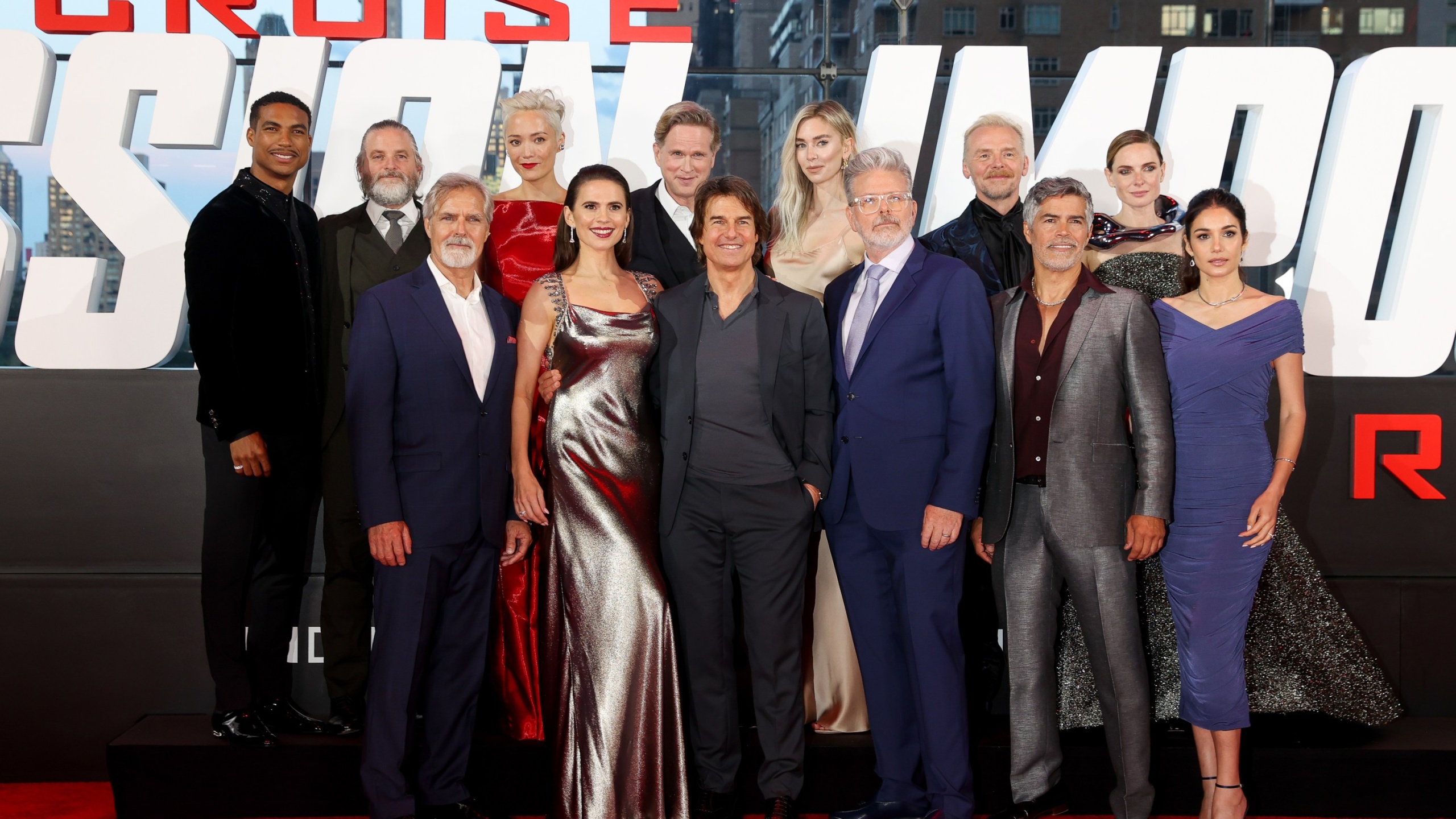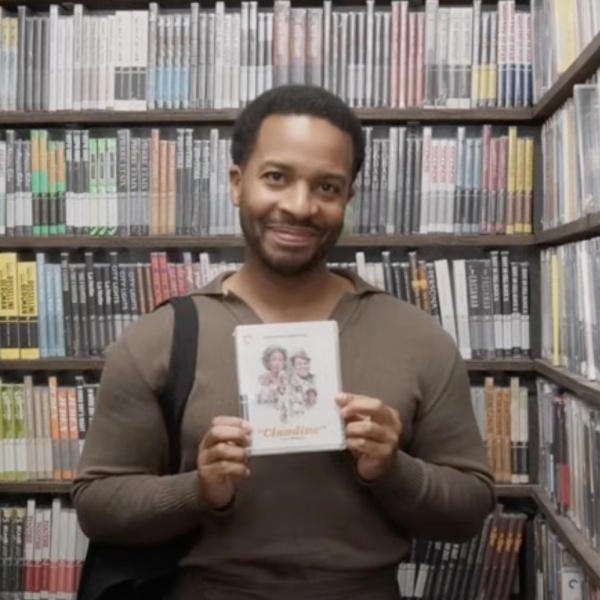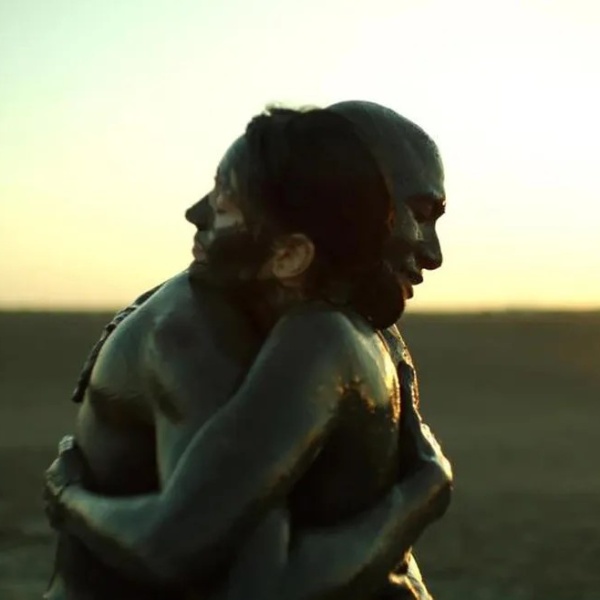[Editor’s note: The following interview was conducted before the SAG-AFTRA strike began on July 14, 2023.]
Hayley Atwell is no stranger to action (the British star is, after all, a bonafide Marvel Cinematic Universe superhero, thanks to her turns across the franchise’s film and TV series as Peggy Carter aka Agent Carter aka Captain Carter), but the star is also a classically trained actress who has excelled in various stage productions, with two Laurence Olivier Awards noms under her belt. Combining those talents and interests in one role? That sounds up her alley.
Enter: Christopher McQuarrie’s “Mission: Impossible – Dead Reckoning Part One,” which sees Atwell making her debut in the eye-popping, stunt-heavy spy world for the franchise’s seventh feature. Alongside star Tom Cruise, Atwell’s pickpocket Grace runs, kicks, runs, punches, runs some more, and drives (sorry, drifts) all over Europe in pursuit of a key that can save the world from nothing less than permanent destruction. Like fellow newbie Pom Klementieff, Grace is a totally new creation in this fast-paced world, and a character that relied heavily on Atwell’s own instincts to be crafted. Stunts and character work: the Atwell way.
Ahead, Atwell tells IndieWire about what she wanted for Grace (not just a femme fatale, not only a victim), her unexpected knack for drifting, and what we might expect to see from her in the second film in the “Dead Reckoning” world.
The following interview has been edited and condensed for clarity.
IndieWire: Considering that you guys have been on tour for, at this point, it feels like months, I wondered: is there anything that you want to talk about this movie that no one has asked you yet?
Hayley Atwell: No. [laughs] I mean, we’ve just covered everything. There’s been so much to share and to say about the process of it. And it’s been fun, because I get to relive and reminisce about the last four years. It was such an ambitious undertaking for the filmmakers, and obviously the obstacles that the whole industry was facing in 2020. On this press tour, it’s been a chance to reflect back a little bit. I’m not a great one for self-reflection.
But I think also, when you’re on a press tour like this, and suddenly reviews come out, and you start to see audiences responding to it, it gives you an extra boost of going, “Yeah, we created this as a pure cinematic experience to be seen on the big screen,” and people are responding to it in the way that we’d hoped.
And people do seem to be responding, that has to give you a boost.
It’s funny, because when people go, “Oh, you must be exhausted,” it’s a bit like when people, after a play, come up to me backstage and go, “How do you learn your lines?” It’s like, “Well, it’s my job.” And I do love it, and I feel just very, I don’t mean to sound glib. I feel really grateful for the experience and the opportunity to work with these guys. When you do an interview, you want to make sure that you’re communicating authentically what the experience is, and not wanting to sound just all, “Everything’s great and rainbows.”

You also surely feel a lot of pride in your character, who you also helped created from the ground up.
[There have been ]so many amazing challenges that I got to address, from the stunts to finding nuance of the character within a franchise this size, and coming in as an outsider, and wondering how Grace would fit into the franchise in a way that offers something new as a female character, and yet added to the already incredible established cast that is so loved worldwide. So to have done that, that’s what’s been energizing.
And to be sat here going, “I am so lucky to do what I do.” Because I set out 17 years ago to dedicate my life to a creative life, and it’s happening. So, I think that helps you sleep at night well.
There are so many compelling female characters in this franchise already, but it’s particularly notable that there’s still space to have you and Pom’s characters, who are both new and totally different, enter a series that’s already six films deep.
It’s a testament to Chris and Tom, because they are always looking to go, “OK, what did we learn from the last one? And what can we take to the next one that we’ve learned from? And what is the next progressive step for this storyline? And how do we serve each actor coming in with their own talents?”
When McQ came to see me in a play 10 years ago, and he took me out for dinner afterwards and said, “That thing that you do on stage…,” and there was a particular moment that he still refers to to this day, and he acts it back to me so well. He’s a really good actor! He knew that he wanted to put it into a story somewhere, he just didn’t know what or when.
So with the creating of this character, I came into the screen test, and they said, “We don’t have a character in mind. We find the actor we want to work with, and then we create the character with them.” To hear that from filmmakers, particularly of their caliber and particularly of a franchise of this size, that [means] you’re giving agency back to the artist immediately. Even in the screen test, as an actor, I’m coming in going, “Oh, OK. In that case, let me try a ton of creative choices and we’ll see what lands.” There’s no good or bad. There are just choices.
I knew Grace would be sort of a lone wolf at the beginning, and her story would be how she is someone who can’t, for whatever reason in her past, trust other human beings, and how isolating that is as an existence, and then how she learns through an art to trust. I just didn’t know, obviously, the details of it, or where that would fit within the plot, or if I could elevate her from being more than one thing, so she wasn’t just the femme fatale, the ice queen, the victim. That she could be full of contradictory qualities, and that you could have moments of levity, vulnerability, self-assurance, self-doubt, fear, and panic, as well as courage of having a go anyway.

That also then came about through watching my stunt rehearsals and my stunt training. Tom and McQ would come in, and check in, and see how my style was coming on, what I seemed to naturally enjoy doing, and then they would fit that to the film. So I discovered quite early, I had a bit of a knack for drifting, and [stunt coordinator] Wade Eastwood was my brilliant teacher in that. So they were like, “Right, you can drift, which means that will be a car chase sequence.”
And then working with Tom, we were watching a lot of movies. A lot of ’70s heist movies, like “What’s Up, Doc?” and “The Sting” and even “Paper Moon.” We’re looking at chemistry between two protagonists, particularly if they’re sort of exasperated by each other, but circumstances have forced them together, and that creates a setup for comedic timing, and how you could fit that into the middle of an action car-chase sequence?
If Grace is seen as being calculating, or manipulative, or attempting to pull the carpet under his feet on purpose because she gleefully enjoys that, then the audience are not going to really want to lean into who she is. It’s a recoil, because it seems to be too cruel, so we found ways of going, “Well, how about that she doesn’t know who to trust, and she’s hyper-vigilant?” So she’s always looking for an escape, because that safety, that self-reliance, is the only thing that she’s really been able to trust. So, Ethan’s job is to convince her that he’s the right one to trust.
Even though we don’t know much about Grace and her background, there is a natural empathy to her, simply because she’s alone and thrust into this insane world. How would anyone react in those circumstances?
When she’s caught in Rome, she then discovers that was Ethan who stitched her up. And you sit there and you realize, “Oh, if she doesn’t get her money, she’s out on a limb there.” She doesn’t have anything or anyone else to rely on, apart from the job she’s having to deliver on, and although it’s a very morally-questionable job, it’s also one that she has forged out of survival. She was an orphan. She hasn’t come from any sort of background of privilege or security, and she’s sort of a scrappy, kind of making it up as she goes along.
So for Ethan to do that, and then also to see Ethan’s capability of knocking out some of the Rome guards, and then that look that she gives him as they’re off into the courthouse, and she’s walking down the corridor with him, and she’s looking at him going, “This guy’s pretty scary.” For him to have all this power and to do those things to her, Oh, my God. So of course, when she gets her opportunity to scream out “pervert!” to him in Italian to be able to get away, for her that’s the safest option.

I’ve enjoyed playing complicated characters, because I think human beings are. We don’t always make the right decisions. A lot of the time we’re making decisions based on instinct for self-preservation, and that exists in all the theater roles I’ve done certainly. Why should the woman be the moral compass and the moral center of the movie?
There was a lovely dear friend of mine called Deborah Frances-White, who runs The Guilty Feminist podcast, and she was talking about the fun-killer test. The fun-killer test is this perception that the woman has to be the wise, moral heart of a story. Say it was the wife in the movie telling the soldier, “Your family needs you, don’t go to war,” if we actually followed her, and what she wants, and what she’s saying, there would be no film. She’d kill the fun of the film. I think that’s a really interesting story arc in terms of crafting a character. It’s like, “If we actually followed her, would the story get more interesting or would we actually kill the action?”
And Grace also refutes something I’ve long been obsessed with tearing down, this notion that female action stars can only be “badass” or a “strong female character” with no nuance or failures.
It’s like when a person is described as one thing. I mean, they aren’t. It’s to do with the person talking about them, and what they have seen of that person, and filtered to that person’s personal experiences and perspective on the world. Any sort of one-off description of a character suggests to me something’s been underwritten.
When you are building Grace knowing that she will be in two films at least, how much are those choices based in, “OK, we want to have this in Part One, and how much are we going to learn in Part Two?” There’s still so much that we need to learn about Grace and her background that I assume we’ll see more of in the next film.
I think what [Cruise and McQuarrie] are great at doing is they’re always looking objectively, from an audience perspective, going, “What is this telling us? What is the frame here communicating? What is this take communicating?” Highlighting the individual talents of the actors that they bring on. So I feel like I always have faith in them, and I have faith in the next installment too that they’ll serve the characters in a way that the audience want. They satisfy their audience. They’re there to delight them and entertain them. So they’re not going to leave them hanging in that regard, I don’t think.
I know that Tom gave Pom skydiving lessons as a wrap gift. What did he give you?
Oh my gosh, so many things. I mean, they’re very personal. He would pilot me and a lot of us to work in a helicopter, and take us out for dinner, and take my family out on the helicopter rides too. And of course the coconut cake.
The coconut cake!
I went skydiving as well. I didn’t love it as much as Pom. I loved it in the sense of, if we were going to use it [in the film], I’ll do something and I’ll learn it if I know it’s going to be used. Because I love acting. Doing the physical stuff for the sake of it, I go, “What’s it for?” I’m always driven by the thing it’s going to be led into. I would’ve continued skydiving if I felt that that would actually been used in the film.
But I think the thing that he’s given me more than anything else, because it’s not about the physical stuff. It’s more about, he’s given me his time. He is always available for a conversation about the techniques of movie-making, of what each department does, the business side of things. Mentoring, and that sense of you’ve just got someone on your side that’s rooting for you. That is unquantifiable. To have his time, and he’s always open to that. The doors are always open to those conversations. There’s no one like him in Hollywood, and I don’t think there ever will be. To have that is an enormous privilege of which I would not take advantage, but I hold with great respect.

My last question is everyone’s favorite question these days: which other major summer movie do you want to see first, “Barbie” or “Oppenheimer”?
Oh, double bill! I’m so excited by them. I mean, from the interviews that I’ve read and the trailers that I’ve seen, they’re such different films, and exceptional filmmakers, and I love the diversity of them. I don’t believe films should be pitted against each other. This is not a competition. Tom and McQ certainly don’t feel like they’re in competition. They want “Oppenheimer” and “Barbie” to succeed, as do I. I want all great movies to be seen on the big screen by as many people as possible, because it’s a celebration of our art form. It’s a celebration of our industry, and it’s what keeps it healthy.
“Mission: Impossible — Dead Reckoning Part One” is now in theaters.


